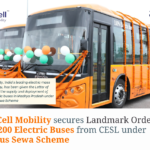
GST on Electric Vehicles (EVs): Latest Rates and Impact
India’s commitment to a sustainable future hinges on electric vehicles (EVs). This informative blog by Tanya Gupta on cleartax.in dives deep into the world of EV taxation, explaining how GST (Goods and Services Tax) impacts both the vehicles themselves and the surrounding ecosystem.
- GST on Electric Vehicles (EVs): Latest Rates and Impact
- Current GST Rate on Electric Vehicles
- GST on EV Products and Services
- Impact of GST on Electric Vehicle Pricing
- Government Incentives and Subsidies on EVs
- Impact on the EV Market and Adoption
- Comparison with Global GST/VAT Policies on EVs
- Challenges and Opportunities on EV Cars
The focus lies on the current reduced GST rates for EVs (5% for cars, 2-wheelers and 3-wheelers, and charging stations) compared to traditional petrol/diesel vehicles (28%). This significant tax difference aims to make EVs more accessible and encourage their adoption.
Current GST Rate on Electric Vehicles
The GST rates on EV cars and charging stations were cut in 2019 to make them more affordable for mass adoption. The HSN code for EV cars is 870240. The current GST rates are as follows:
| Particulars | Current GST Rates (After Aug 2019) |
| EV cars | 5% |
| EV 2-wheelers and 3-wheelers | 5% |
| Electronic Charging Stations | 5% |
| Petrol/CNG/LPG/Diesel Vehicles | 28% |
GST on EV Products and Services
GST is not limited to the sales of electric vehicles, but it even affects the industries that operate in concert. To truly understand the impact of GST on electric vehicles in India, it is essential to learn about its impact on EV ancillary products. Here’s how different components within the EV ecosystem are taxed under GST:
🔹 EV Batteries: The GST on EV batteries is 5%. In 2022, it was dropped to 5% from 18%.
🔹 Charging Infrastructure: This includes chargers, charging stations, and related equipment. Currently, the GST rate on EV charging infrastructure is 5%.
🔹 EV spare parts and accessories: EV spare parts are covered under the general category for unlisted goods. Hence, they do not attract any special GST rates. Currently, they are taxable at 28% instead of 12% earlier.
🔹 Maintenance & Repairs: The GST on servicing EVs is 18%, which is charged for the entire service.
🔹 Software for EVs: The GST on electric vehicle software can range between 5%-18% depending on the type of software used.
Impact of GST on Electric Vehicle Pricing
The impact of GST on electric vehicles is multifold. It cannot be seen as limited to only one aspect. However, we can understand how the drop from 12% to 5% in the GST rates on EV cars can affect consumers. Let’s see what buying an EV or a Petrol/Diesel Vehicle costs Rs. 10 Lakhs is like in your pocket.
| Particulars | EV @ 12% (Old) | EV @ 5% (New) | Petrol/Diesel Car @ 28% |
| Cost | 10,00,000 | 10,00,000 | 10,00,000 |
| GST | 1,20,000 | 50,000 | 2,80,000 |
| Total Cost | 11,20,000 | 10,50,000 | 12,80,000 |
The impact of GST rates on EV cars is evident from the above example. Buying an EV in India instead of a petrol/diesel car can save Rs. 2.30 Lakhs in GST. The 12% to 5% rate reduction has also saved Rs. 70,000 for the buyer in the above example. How does this impact the overall market? Let’s see:
▶️ Lower Costs: The price of EVs is much lower than that of petrol/diesel vehicles because of the lower GST.
▶️ Increased Demand: Low GST rates on EV cars make them attractive to more customers and increase demand.
▶️ Support for Commercial EV Adoption: The GST benefits also extend to commercial EVs. Hence, it boosts the adoption of electric taxis, delivery vehicles, etc.
Government Incentives and Subsidies on EVs
The benefits of EVs are not limited to the low GST rates on EV cars. Various government schemes provide subsidies and incentives to EV users. Here are some of the important ones:
▶️ PM E-Drive: To increase the demand for EVs in the country, the government approved FAME-II (Faster Adoption and Manufacturing of Hybrid and Electric Vehicles). Under this scheme, EV buyers in different categories received demand incentives. Following the erstwhile FAME II scheme that ended this year, the government has launched the PM E-Drive scheme to cover the benefits under FAME III. Applicable from October 2024 to March 2026, the government is providing subsidies on the purchase of:
✔ e – 2 Wheelers
✔ e – 3 Wheelers
✔ e – Trucks
✔ e – Ambulances
✔ e – Buses
▶️ Demand Incentive: The MHI (Ministry of Heavy Industry) will issue e-vouchers under the PM E-Drive scheme to provide a discount upfront on the purchase of EVs. You can register for the PM E-Drive Portal and complete your KYC to benefit from this demand incentive.
▶️ 80EEB: Deduction of interest on a loan for buying EVs is provided for income tax up to Rs. 1.5 lakhs per year. However, this deduction is only available in the Old tax regime.
▶️ PLI Schemes: The government is offering production-linked incentives to auto companies for manufacturing EV parts domestically, which is making EVs cheaper.
▶️ State-Level Subsidies: State governments also provide benefits to EV buyers, including:
✔ Interest Subvention
✔ Road Tax Exemption
✔ Registration fees exemption
✔ Scrapping incentives
Impact on the EV Market and Adoption
The lower GST on electric vehicles has had a positive impact on the EV market:
📌 Increased Sales: The sales of EVs have seen a 91% increase in FY 2023-24.
📌 Domestic Manufacturing: The PLI scheme and low GST on electric vehicles has boosted the local production of EVs and their components.
📌 Infrastructure Development: Both production and charging infrastructure are being built steadily. The reduced GST rates on EV cars and charging stations have led to this increase.
Comparison with Global GST/VAT Policies on EVs
| Countries | VAT/GST rate on EV Cars | VAT/GST rate on EV Charging Stations |
| India | 5% | 5% |
| United States | Sales Tax varies by States | Sales Tax varies by States |
| United Kingdom | 20% | 20% |
Challenges and Opportunities on EV Cars
Despite the low GST on electric vehicles, the EV industry in India faces many challenges. Let’s look at the challenges and opportunities for the EV industry:
| Challenges | Opportunities |
| High battery cost is a concern for EV buyers.The lack of charging infrastructure is repelling buyers.Regulatory hurdles to getting the benefit of state-wise subsidies are another challenge.No refund of Input Tax Credit (ITC) on capital goods and input services to the manufacturers due to inverted duty structure. This had lead to blocking of funds and cascading effect. | Demand growth in electric taxis and delivery vehicles.PLI schemes to promote local EV production. |
The government has reduced GST on electric vehicles to make them more affordable and widespread. The combination of government schemes and incentives, along with the reduced GST rate on EV cars, is leading the climate initiative. However, many challenges, like high battery costs, lack of charging infrastructure, etc., need to be corrected first.









